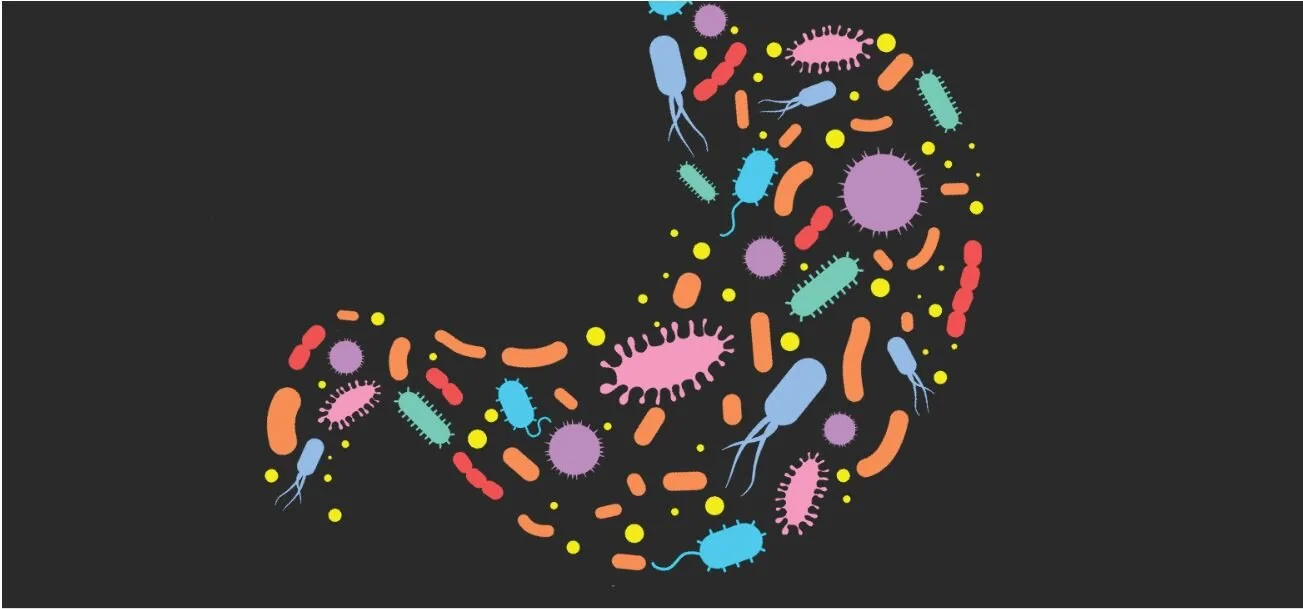Think with Your Gut
by Samyuktha Manikandan
You have that gut feeling, your intuition, your instinct - the feeling that tells you right decisions from wrong decisions. This feeling is not a figure of speech. It is actually a signal from our second brain: our gut! The discovery of the Gut-Brain Axis, a bidirectional communication system between our gut’s microbiome and brain, is changing the medical community’s perception of the digestive system and is revolutionizing the course of medicine. The fact that our gut microflora can influence our emotions and behaviors and thus our mental health has led to a greater focus on maintaining a healthy gut microbiome.
The microbiome’s balancing act between different types of microbes is crucial for maintaining a healthy digestive system and influences both mental and neurological health. Research has shown that an unbalanced microbiome can lead to stress, depression and anxiety through incorrect production of certain neurotransmitters. A European study revealed that a lowered immune response caused by students’ test anxiety can be improved through the use of probiotics, which create a balanced gut microflora. Other studies have focused on how dysbiosis, or an imbalanced microbiome, can lead to an increased risk of neuronal cell death that can cause certain neurodegenerative disorders like Alzheimer’s disease. This ability to change our mental and neurological health reinforces the importance of maintaining a healthy gut microbiome.
What happens when you have an unhealthy gut?
Some common symptoms of dysbiosis are indigestion, nausea, bloating and bad breath. These are caused by the inability to break down certain sugars, a job typically accomplished by groups of bacteria in your gut. Some studies have shown that increases in microflora disturbance can lead to an increase in allergic responses, which can cause skin conditions such as atopic dermatitis. Dysbiosis may also increase the risk for conditions like diabetes, obesity, celiac disease and even colon and rectal cancers.
The Way to A Healthy Gut Microbiome
A person’s lifestyle is a major factor that affects the microbiome. Diet, specifically their intake of macronutrients like carbohydrates, lipids and proteins, can affect the composition of the gut microbiome. Since bacteria have preferred food sources, diets that have a higher content of a certain nutrient could result in higher growth of certain bacteria. In order to maintain a healthy gut, researchers suggest a diet low in saturated fats like butter and certain cheeses. High saturated fats can trigger a decrease in good bacteria needed for a healthy gut. Other studies have shown that overconsumption of red meat may also promote the growth of bad bacteria and could even increase the risk of Irritable Bowel Disease, a disorder of the large intestine without a well-defined cause. Conversely, consuming foods high in the plant compound polyphenol, found in red wine, green tea and dark chocolate, can improve the overall composition of the gut microbiome. Overall, medical professionals and clinical scientists recommend staying away from high fat, low-fiber and heavily processed foods to maintain a healthy gut and a healthy mind.
Common supplements that are discussed when talking about gut health are probiotics and prebiotics. Probiotics have active cultures of good bacteria that are needed to maintain a healthy gut microbiome. They are found in foods such as yogurt and fermented products. These include kimchi, sauerkraut and miso soup. For a more effective dose of active, good bacteria, probiotics can also be ingested in the form of a pill. Prebiotics are food sources for the good bacteria that allow for a balanced microbiome. They can be consumed in the forms of high-fiber foods like barley and those rich in prebiotic inulin, such as garlic, asparagus and oats. Both prebiotics and probiotics help maintain a healthy composition of good bacteria that are important for gut health.
Our day-to-day activity also influences our microflora composition. Low intensity exercise can be beneficial to the microbiome composition by decreasing the amount of time bad bacteria stay in the gut, thus increasing the ratio of good to bad bacteria. A study examining the microbiome compositions of a group of rugby athletes indicated that they had high bacterial diversity, which is another factor in a healthy gut microbiome composition.
When we get a bacterial infection, we are commonly prescribed an antibiotic to treat it. Though this is an effective way to treat disease, it can actually hurt our gut microbiome. Many antibiotics do not differentiate between good and bad gut bacteria. They can therefore end up killing good bacteria, thus harming our digestive system. Some research has even indicated that administering antibiotics to children at a young age could lead to an increased risk for obesity later in life.
The gut microbiome plays a more essential role in human health than the medical community had originally realized. It encompasses a multitude of bacteria, viruses, archaea and eukaryotic microbes that can surpass the number of human cells in the human body. Once thought of as its own isolated system, the gut and its microbiome can extend its reach and influence our brain and change how we think, feel and behave. As more and more people recognize the importance of mental health, it is also important to keep in mind the significance of maintaining a healthy gut.
